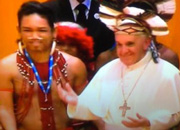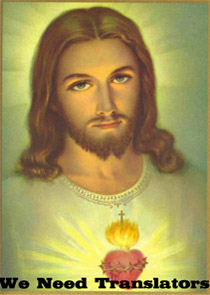Traditional Catholic Liturgical Calendar by Month
Liturgical calendars for the Traditional Roman Rite for the Universal Church (not including national variations) may be viewed or printed for the following months:
Explaining the laws of fast and abstinence, for days of fast and abstinence
Rules of Fast and Abstinence
Following the Rubrics of Pope Pius XII (1957)
On days of fast, only one full meal is allowed, at which meat may be taken. Two other meatless meals, which together are less than the full meal, are also permitted. Only liquids may be taken between meals. The law of fast must be observed by all between the ages of 21 and 59 inclusive under pain of mortal sin.
If fasting poses a serious risk to health or impedes the ability to do necessary work, it does not oblige.
There are also certain days of abstinence.
On days of complete abstinence (such as all Fridays), meat and soup or gravy made from meat (or anything made from meat) may not be taken at all under pain of mortal sin.
On days of partial abstinence, meat (and soup or gravy made from meat) can be eaten only once. The law of abstinence must be observed by everyone age 7 and older under pain of mortal sin.
There is no obligation of fast or abstinence on a holy day of obligation, even if it falls on a Friday (such as Christmas).
Eucharistic Fast
1. Priests and faithful before Mass or Holy Communion – whether it is the morning, afternoon, evening, or Midnight Mass – must abstain for three hours from solid foods and alcoholic beverages, and for one hour from non-alcoholic beverages. Water does not break the fast.
2. The infirm, even if not bedridden, may take non-alcoholic beverages and that which is really and properly medicine, either in liquid or solid form, before Mass or Holy Communion without any time limit.
Priests and faithful who are able to do so are exhorted to observe the old and venerable form of the Eucharistic fast (from foods and liquids from midnight). All those who will make use of these concessions must compensate for the good received by becoming shining examples of a Christian life and principally with works of penance, self-denial and charity (and fervent prayer).
(Pope Pius XII, Sacram Communionem, 1957)
Holy Days of Obligation (USA)
1. The Circumcision (January 1)
2. Ascension Thursday (Varies)
3. The Assumption of the Blessed Virgin Mary (August 15)
4. All Saints' Day (November 1)
5. The Immaculate Conception (December 8)
6. Christmas (December 25)
Days of Fasting and the Lenten Fast
Many of the early Fathers of the Church – St. Jerome, Pope St. Leo the Great, St. Cyril of Alexandria, and St. Isidore of Seville – tell us that the season of Lent was instituted by the Apostles themselves from the very commencement of the Church. They legislated a universal fast to serve to purify our souls of sin and to subdue our passions and inclination to sin.
The Apostles took the period of forty days from the penances in Sacred Scripture – the Great Flood of forty days and forty nights, the wandering of the Jews in the desert for forty years to prepare for their entry into the Promised Land, the fast of our Lord for forty days and forty nights in the desert to give us an example of penance, recounted in the Holy Gospel of the First Sunday of Lent.
The traditional Lenten fast pertains to every day of Lent from Ash Wednesday until Easter, except Sundays, for those over 21 and under 59 years of age. The fast allows one large meal with meat and two small meals less than the large without. Between meals no solid food is permitted. Complete abstinence from meat pertains to those over age 7 on Ash Wednesday and, of course, on Fridays.
This is a mild and weak form of fasting that the Church permits today compared to what was practiced by our Christian predecessors in earlier centuries, but one that leaves us a little on the hungry side and aware that we are depriving ourselves of the temptation to eat whenever we feel like it. Through this Lenten practice of light self-mortification, we remind ourselves to subordinate our bodies to higher spiritual purposes and to use them for God's purposes.
Our self-imposed modern diets, often undertaken only for reasons of health – or worse – vain surface physical appearance, are usually much more severe. How much more important it is, rather, to fast for our interior spiritual beauty, completely despising the physical appearance. Indeed, we should be "thanking God for being neglected by creatures so that she may be attached to Him alone." (St. John Vianney, Sermons of the Cure of Ars)
The Old and Venerable Form of Fasting
Priests and faithful who are able to do so are exhorted to observe the old and venerable form of fasting (see Black Fast below). However, since this strictness may not be suitable for most people a compensation may be made, and that is that only one full meal a day or two smaller meals that is about the same (or a little more than the full meal per day) be taken. So either one of these per day and not both as the modern day weak and pathetic fast permits. Most people should be able to do this on regular fasts. However, this fast is much harder to practice during Lent. In general, the less one eats the better, and if the above fast is too much for a person, then he should try to eat three smaller meals a day instead and skipping the full meal or eating a full meal and one smaller meal and skipping the second small meal. All those who will make use of these concessions must compensate for the good received by becoming shining examples of a Christian life and principally with works of penance, self-denial and charity (and fervent prayer).
The Black Fast (from Catholic Encyclopedia)
This form of fasting, the most rigorous in the history of church legislation, was marked by austerity regarding the quantity and quality of food permitted on fasting days as well as the time wherein such food might be legitimately taken.
In the first place more than one meal was strictly prohibited. At this meal flesh meat, eggs, butter, cheese, and milk were interdicted (Gregory I, Decretals IV, cap. vi; Trullan Synod, Canon 56). Besides these restrictions abstinence from wine, specially during Lent, was enjoined (Thomassin, Traité des jeûnes de l'Église, II, vii). Furthermore, during Holy Week the fare consisted of bread, salt, herbs, and water (Laymann, Theologia Moralis, Tr. VIII; De observatione jejuniorum, i). Finally, this meal was not allowed until sunset [for most people, a 4 hour wait period (at least) before the meal may be more suitable]. St. Ambrose (De Elia et jejunio, sermo vii, in Psalm CXVIII), St. Chrysostom (Homil. iv in Genesim), St. Basil (Oratio i, De jejunio) furnish unequivocal testimony concerning the three characteristics of the black fast. The keynote of their teaching is sounded by St. Bernard (Sermo. iii, no. 1, De Quadragesima), when he says "hitherto we have fasted only until none" (3 p.m.) "whereas, now" (during Lent) "kings and princes, clergy and laity, rich and poor will fast until evening". It is quite certain that the days of Lent (Muller, Theologia Moralis, II, Lib. II, Tr. ii, sect. 165, no. 11) as well as those preceding ordination were marked by the black fast. This regime continued until the tenth century when the custom of taking the only meal of the day at three o'clock was introduced (Thomassin, loc. cit.). In the fourteenth century the hour of taking this meal was changed to noon-day (Muller, loc. cit.). Shortly afterwards the practice of taking a collation in the evening began to gain ground (Thomassin, op. cit., II, xi). Finally, the custom of taking a crust of bread and some coffee in the morning was introduced in the early part of the nineteenth century. During the past fifty years, owing to ever changing circumstances of time and place, the Church has gradually relaxed the severity of penitential requirements, so that now little more than a vestige of former rigour obtains.
Traditional Liturgical Calendar
Following the Rubrics of Pope St. Pius X
For the Universal Calendar (Roman Rite) of the Church
After the principal feast or ferial of the day appears its liturgical rank:
d1cl - double of first class
d2cl - double of second class
dm - double major feast
d - double feast
sd - semi-double feast
sp - simple feast
v - vigil
f - ferial day; no feast appointed
Then any commemorations appropriate to the day in their proper order, and finally the color of vestments pertaining to the Mass and Divine Office of the day:
B - black
G - green
R - red
V - violet
W - white
x - Requiem or Votive Mass permitted on this day
To Saints' names are appended their title:
Ab - Abbot
Ap(p) - Apostle(s)
Bp(p) - Bishop(s)
C(c) - Confessor(s)
D - Doctor
Ev - Evangelist
M(m) - Martyr(s)
P(p)- Pope(s)
V(v) - Virgin(s)
W - widow
Days of fast, partial abstinence, and (complete) abstinence from meat are also indicated as observed since 1952:
Abstinence. All persons over seven years of age must abstain. This means that they may not take fleshmeat, meat gravy, or meat soup at all on days of complete abstinence, which are all Fridays (except on holydays of obligation), Ash Wednesday, Holy Saturday (until noon), and the Vigils of the Immaculate Conception and Christmas.
Fast. All persons over twenty-one and under fifty-nine years of age must fast. This means that on a fast day they may have only one principal or full meal and two smaller meals. They may eat meat at this principal meal, except on days of complete abstinence. At the two smaller meals they may not have meat, but they may take sufficient food to maintain their strength. However, these two smaller meals together should be less than a full meal. Eating between meals is not permitted, but liquids, including milk and fruit juices, may be taken any time on a fast day. The days of fast are the weekdays of Lent including Holy Saturday (until noon), the Ember Days, and the Vigils of Pentecost, the Immaculate Conception, All Saints' Day, the Christmas Ember Days, and the Vigil of the Nativity or Christmas (December 24).
Those not bound to fast may eat meat as often as they wish, except on days of complete abstinence (when it may not be eaten at all), and on days of partial abstinence (when it may be eaten only at the principal meal). When a person's health or ability to work would be seriously affected by fasting or, in even rarer cases, by abstaining, it does not oblige.
All those who will make use of these concessions must compensate for the good received by becoming shining examples of a Christian life and principally with works of penance, self-denial and charity (and fervent prayer).
Liturgical Calendar by Month
Liturgical calendars for the Traditional Roman Rite for the Universal Church (not including national variations) may be viewed or printed for the following months:




















































